Lithuania’s Roma struggle to find new homes after mass eviction
It was once the largest Roma settlement in the Baltics, but many residents of the site on the outskirts of Vilnius have been made to demolish their own homes and leave. Months later, some still have nowhere to go.
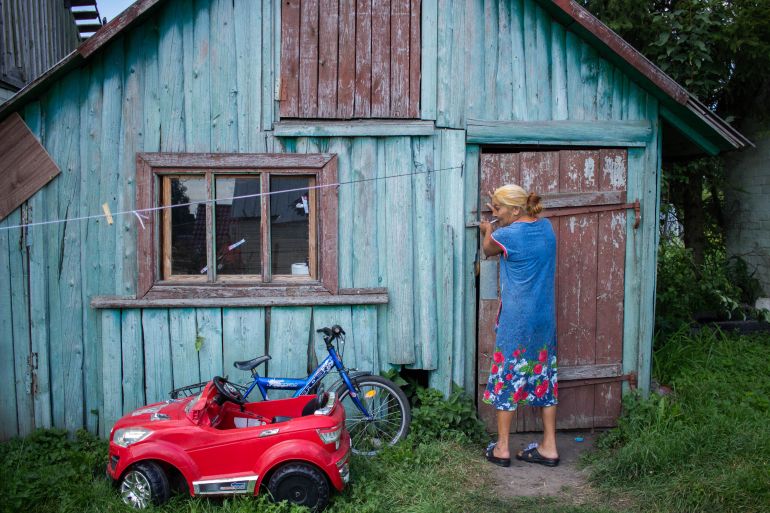
On an August day in Juodšiliai, a village in southeast Lithuania, sunlight spilled through a small window, illuminating the peeling wallpaper and worn-out walls of Rada and Jonas Aleksandravičiai’s new home.
Their three children sat on a couch, playing with a mobile phone while their mother observed them carefully. From outside, a deep voice beckoned. It was Jonas. He and a neighbour were trying to fix the house’s water system so that the water pipes would start running again.
Keep reading
list of 4 itemsVictims of Sinti and Roma Holocaust remembered at Auschwitz
Without safe homes or jobs, Italy’s Roma fear coronavirus impact
Europe’s Roma face ‘environmental racism’: report
The family moved to Juodšiliai, some 20km (12 miles) from the capital Vilnius, a few months earlier.
They were one of the last to leave their section of the Roma settlement in Kirtimai district on the outskirts of Vilnius in March – a few months before it was demolished.
Jonas, 44, and Rada, 48, had lived in the settlement since they were children. The last official count by the Vilnius municipality in 2005 said it was home to approximately 511 Roma: 146 children and 365 adults. In recent years the number of residents might have decreased due to emigration but there are no official statistics available.
The entire area was about six hectares (15 acres) in size and included parts of the railway and a nearby forest. It was made up of three sections: Žemutinis taboras, Aukštutinis taboras and Rodūnios road.
Only the settlement on Rodūnios road remains, but several families Al Jazeera visited there said they had been told they would also have to take their houses down in the near future.
The demolition of the settlement is part of the Vilnius Municipality’s Roma Integration Plan that came into effect in 2016. The plan listed seven aims, one of which was to improve the living conditions of Roma residing in the settlement. In order to achieve that, the municipality said it would move families to alternative housing.
Since the plan came into action, families in the settlement have been asked to demolish their homes and move. Those Roma who declared their incomes were offered rent compensation (of up to 92.50 euros per person per month, paid to their landlord) to cover part of the cost of their new accommodation, while others were offered social housing.
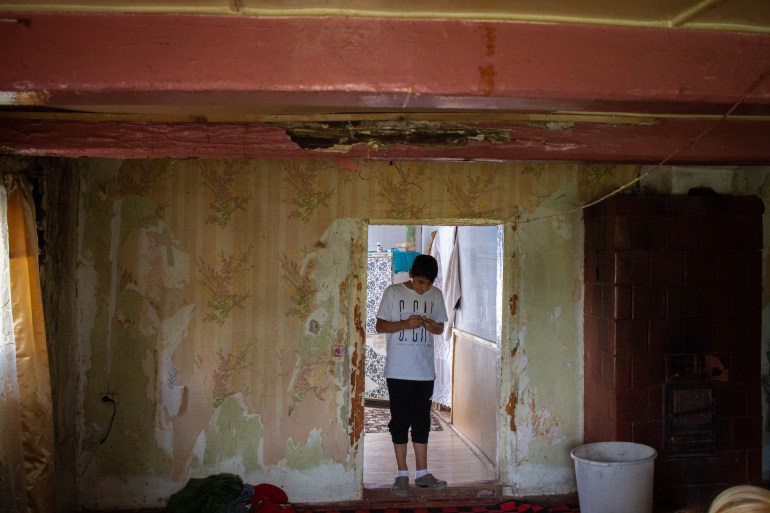
But finding new homes proved extremely difficult due to the higher costs of houses elsewhere and negative attitudes towards the Roma community among landlords.
In Juodšiliai, Jonas pointed at the peeling wallpaper in the living room. “We need to fix the house,” he said. The building is old and needed to be weather-proofed while it was still warm outside. But the family worried about spending more money without real guarantees. “The winter is coming soon but we do not know if we can still stay here tomorrow. The owner can come at any time and tell us to leave.”
Since they moved in, their landlord has not received any money from Vilniaus miesto būstas – the municipality-owned city housing enterprise responsible for paying the promised rent compensation. Vilniaus miesto būstas told Al Jazeera via email that funds had not yet been made available to cover people who live in areas outside of Vilnius city.
The settlement
Before moving to the village, the Aleksandravičiai lived in the Aukštutinis taboras section of the Roma settlement. Nearby, separated by part of a disused railway and a small forest, is where the Žemutinis taboras section used to be. In 2004, Žemutinis taboras looked like a small village, but it is nothing like that now. The remains of former houses hidden in the tall grass are the only reminder that people used to live there.
Both Aukštutinis and Žemutinis taboras are now gone and with it most of what had once been the largest Roma settlement in the Baltics, with 115 homes in 2009.
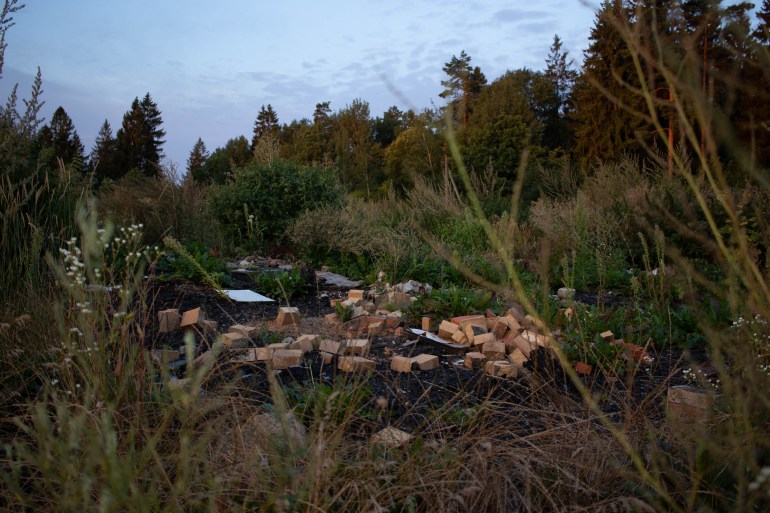
The origins of the Roma settlement dates back to 1956, to the Soviet occupation in Lithuania, when the first legal dormitory-type house for eight Roma families was built. Back then an order was issued requiring Roma to register their living place and find a job or face prosecution and even exile to Siberia for up to five years.
The first legal house was built with the permission of the chairman of the kolkhoz – a type of farming collective in the Soviet Union – who allowed Roma to register on kolkhoz land. Soon, Roma started constructing other houses alongside the first, which stood at number 185 Dariaus ir Girėno Street, because they were allowed to register at its address. But the new houses were never recognised as legal.
Over time, the settlement began to grow. More houses went up – some were shanty-like structures while others were well built. Stoves were used to heat the houses, while water points were located outside – with hand-pumps in several places throughout the settlement. Next to the closest bus stop, a little shop opened to provide the basics. And in 2001, the Roma society’s centre, a public enterprise responsible for Roma integration into society, was built; so was a sauna.
Several generations of Roma families spent their whole lives in the area.
“We were used to that place, I was born there …” said Jonas, in dreamy reflection, remembering what it was like to live in the settlement. He seemed to want to say something more, but an emotional Rada interrupted him: “All our friends were there, it is very, very sad,” she lamented.
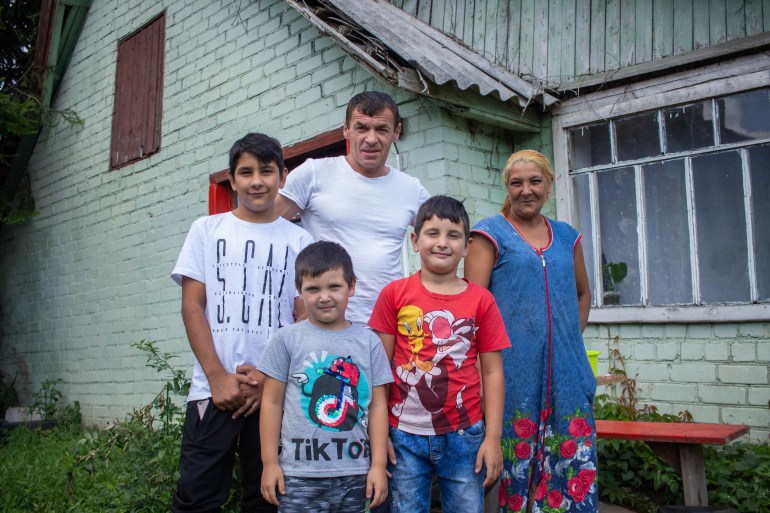
‘Everyone sees the problem but not its cause’
Even though the settlement was their home, not everything about life there was positive. In the 1990s, some of the residents started getting involved in drug trafficking. It is one of the reasons Jonas saw a benefit in moving away. “It is better for children,” he said. “I didn’t want them to grow up in that criminal environment.”
The municipality’s justification for demolishing the settlement was also that it had become a hub for criminal activity, in particular the sale of drugs.
“It had become a very condensed, uncontrolled spot for heavy drugs trafficking,” said Vytautas Mitalas, now a member of the Lithuanian Parliament but who was the vice mayor of Vilnius when he spoke to Al Jazeera.
In 2017, due to the use of intravenous drugs, ambulances were called to the settlement 281 times; 22 of these cases resulted in death. That accounts for a little more than half of all deaths linked to drug use in Vilnius city, as reported in the Drug, Tobacco and Alcohol Control department’s 2018 report. From 2018 to 2019, the number of calls related to drug use in the settlement fell drastically – from 118 calls in 2018 to 41 calls in the first eight months of 2019. The 2019 report said the shrinking numbers could be connected to evictions in the Roma settlement, but it added that this did not mean drug usage was lower but rather that it had shifted to other parts of the city.
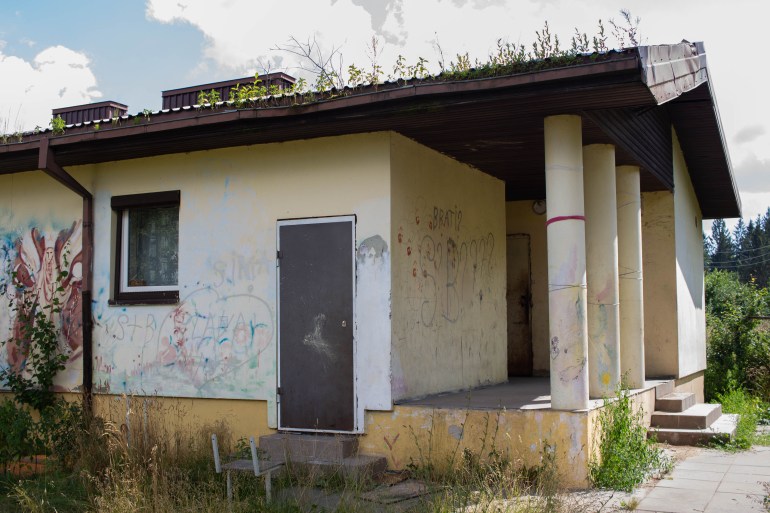
“People were very poor, they subsisted on drug trafficking to feed themselves and their families,” said Gopalas Michalovskis, a Roma who used to work in the department of national minorities before he moved to Hungary in the autumn for the Roma Graduate Preparation Program at Central European University. “Everyone sees the problem but not its cause. Why is that person selling drugs? Because he is unable to earn enough money.”
Roma comprise less than 1 percent of Lithuania’s total population. But based on research from 2015, nearly 40 percent of Roma were unemployed. In comparison, the country’s overall unemployment rate that year was less than 10 percent, according to Lithuania’s official statistics portal. According to the same research from 2015, 75 percent of Roma lived in poverty while the country’s average that year was almost four times lower – about 20 percent.
‘Your house will be taken down’
Lithuanian anthropologist Aušra Simoniukštytė has been researching the Roma community. She is supportive of the Vilnius municipality’s plans to move people as long as they get alternative housing and are not “forced to move against their will”.
But that is not what happened, according to Svetlana Novopolskaja, the director of Roma society’s centre that used to be in the settlement until it was relocated to Naujamiestis district, six kilometres away. She said even though people were first asked to leave a few years ago, the centre had been trying to extend the time frame, hoping that alternative housing would be offered.
“We were naive,” said Novopolskaja, who is ethnically Russian. “We hoped that firstly families would be given alternative housing; [a] ridiculous [hope].”
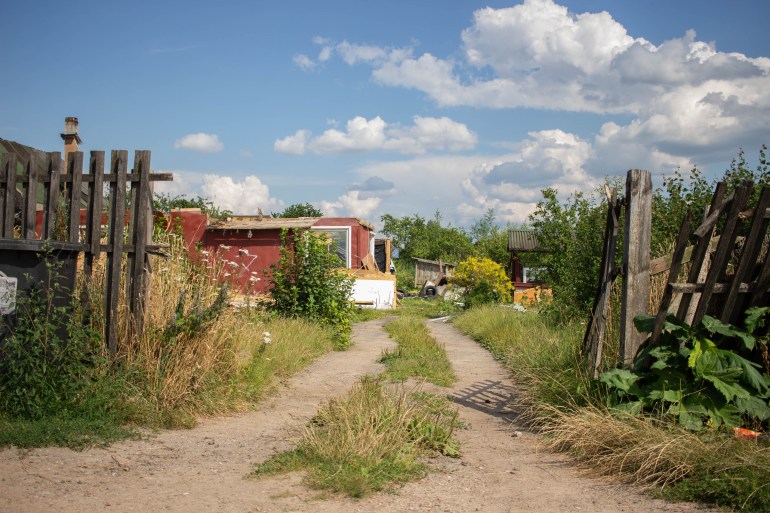
Agnė Liaukonytė, a representative of Vilniaus miesto būstas, the body that runs the social housing administration, told Al Jazeera by email that families who disclosed their income were eligible for rent compensation. But they first had to follow orders given by the State Territorial Planning and Construction Inspectorate to take their house down, move out, and find a new place to live.
In February 2020, Rada received a visit from Inspectorate officials. “Get ready bit by bit, your house will be taken down after a month,” they told her.
At the time of the eviction, Jonas was serving a one-and-a-half-year prison sentence for fraud and was not around to help with the move. Rada, who cannot read or write, said finding a new home without him was a real challenge.
‘Forced to leave’
Anthropologist Simoniukštytė noted the lack of help offered by social and other municipal workers assigned to support the Roma. “It is not that the integration plan is bad itself, I cannot say that. The issue is the careless attitude of the people in charge of implementing the plan.”
Families who had not left the settlement said they faced pressure from police, even though they had nowhere else to go. Novopolskaja said police searches were held without warrants as they considered the houses illegal; during these searches, houses would be destroyed.
“They (police) did whatever they wanted. The first thing that would be demolished was a stove. Especially during the winter,” Novopolskaja said, describing what she saw from the windows of the centre. The reason the police gave for destroying ovens was that they were looking for drugs, she explained.
“Maybe someone was hiding drugs there, but everybody’s stoves were destroyed,” Novopolskaja added. Even though the police found nothing, families could no longer return to their houses, which were now too damaged to live in. “People didn’t have anywhere to go, they would live in our sauna, even in the basement.”
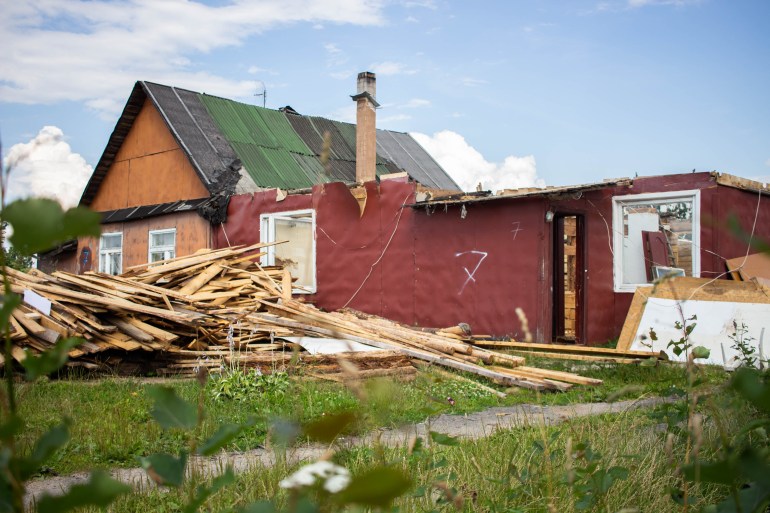
Novopolskaja shared a story of an elderly woman she knows who tried to reason with the police, saying she was unable to take her house down as she had nowhere else to go. The response she received was that she could get a house in Panevėžys. “By this they meant the prison,” explained Novopolskaja, adding that Panevėžys, a Lithuanian city located a few hundred kilometres away from Vilnius, is the site a women’s prison.
In September 2020, the price for a one-room apartment in Vilnius ranged from 210-480 euros ($250-580) per month, according to a survey by real estate company Ober-Haus. For an elderly Roma woman, this would likely be out of reach, even with the rent compensation, explained Vita Kontvainė, a Lithuanian researcher at the Institute of Ethnic Studies. “An old Roma woman is living alone. She will get compensation for the rent. Try to find a flat for this money (92.50 euros – $112),” she remarked.
Reflecting on the eviction process, Rada said: “It didn’t matter if you had somewhere to go or not. We were forced to leave.”
‘It wasn’t a stroll’
Former Vice Mayor Mitalas disagreed. He told Al Jazeera “the process was pretty intensive. It wasn’t a stroll. But inspectors didn’t show up at the last minute to throw people out of their home”.
“The majority of the houses were taken down by the people themselves. It proves that the process was not organised in a way that a third power comes in and takes everything down.”
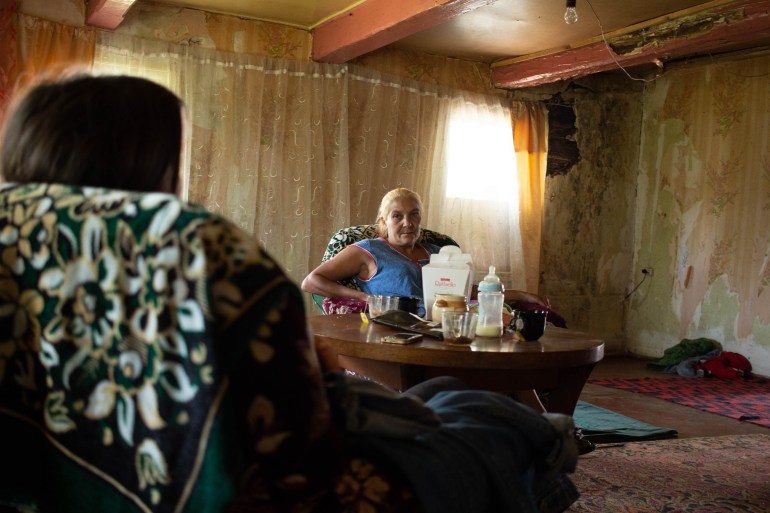
In fact, those Roma who did not take their houses down were fined for not following an order given to them by the State Territorial Planning and Construction Inspectorate.
In emails to Al Jazeera, the Inspectorate explained they would inform people that their houses had to be taken down and, if this was not done within the allotted time, they would ask the bailiff to deal with it in court. The court would then decide on the size of the fine for each family. Families were obliged to cover demolition costs, and also pay to clean up the area.
According to information she received from bailiffs and police, Novopolskaja said the fines, together with the demolition fee, would amount to about 3,000 to 6,000 euros ($3,647-7,295). The Inspectorate told Al Jazeera it could not confirm what fines were given to families and that it was the court’s decision.
When Rada moved out of the settlement, she left her house standing. Navigating the move alone, in winter, with three children and no alternative housing made taking the house down by herself an impossible requirement, she explained.
She said a policeman told her she would be fined 5,000 euros ($6,079) for not demolishing it. She never received a notice of the fine, but suspected this may be because she moved a few weeks before her house was demolished and the letter may have been sent to her previous address.
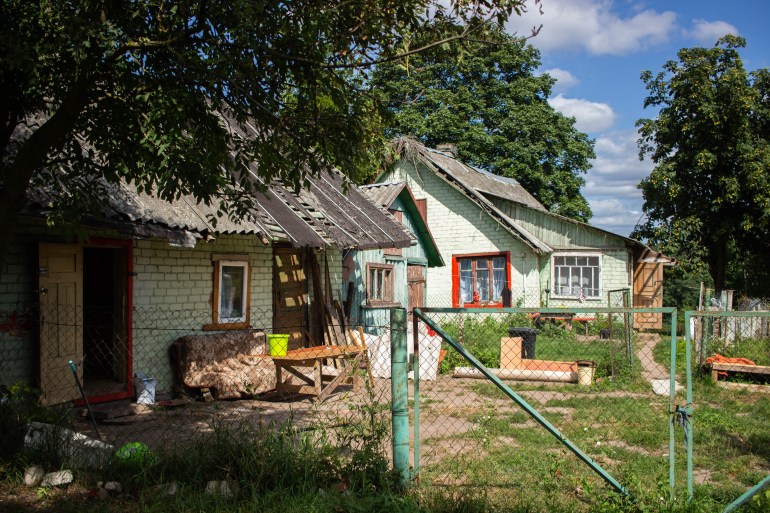
Erik Jalovik, the head of the second police commissariat – a station responsible for the Kirtimai area where the Roma settlement used to stand – told Al Jazeera police did not communicate anything to the residents about demolishing their houses. In an email, he said police accompanied state officials on visits to the area to ensure public order, but any orders related to the eviction came only from Inspectorate officials.
‘They started cutting down all the trees’
On Rodūnios road – the part of the Roma settlement that is still standing – another family of seven said they also received demolishment orders from the police. The family started taking their house down at the beginning of the summer, so as to avoid the fine.
“A policeman came and said: ‘Go wherever you want.’ My mom looked at him open-mouthed. She didn’t know what to do,” said David, 29, who asked that his real name not be used for fear of pressure from the authorities. The family was given three months to relocate.
“They started cutting down all the trees growing in the settlement: plum-trees, cherry-trees, pear-trees, fir-trees,” David said. “Once I started filming, the policemen told me to delete the footage. I knew that I had the right to film there, but he told me that he will take me to the police station. Why would I want to go there? So, I deleted it.”
The family plans to rebuild their house on a piece of land they own. But they are getting no support from the municipality for this. “It is really hard, especially after quarantine. We didn’t have any work and spent three months at home,” David lamented.
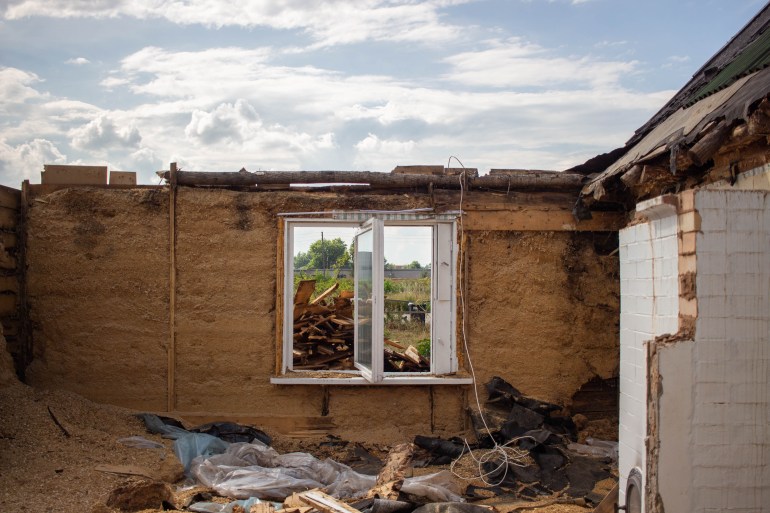
Since they started demolishing their house six months ago, the family has been staying with David’s grandfather. But they now feel they have been fooled, saying just them and one other family have taken their houses down on Rodūnios road – while the rest of that part of the settlement still stands. When Al Jazeera queried this with the Inspectorate, they said Rodūnios road only had three illegal houses – and those had already been taken down in 2013. They added that they are unaware of any orders for eviction given at the beginning of the summer and therefore could not comment.
Novopolskaja said that as far as she knew, there were no written eviction orders given to families living in Rodūnios road. She said she tried to convince David’s family not to demolish their house, but they were afraid of what might happen if they did not follow the orders. When asked about the situation, police representative Tomas Bražėnas responded via email saying “officers have been visiting this part of the settlement but police officers do not give orders for evictions because this is not in their jurisdiction”.
Search for home
In Juodšiliai, the house that Rada and her family now live in needs some reconstruction work. But it is big enough for the family of five and has a yard where the children can play. The family also gets along well with their neighbours.
Rada found the place with help from a taxi driver she met by chance after she left the settlement. But according to the Roma integration plan for 2016-2019 (which was valid until August 2020), rent for housing outside of Vilnius city does not get compensated.
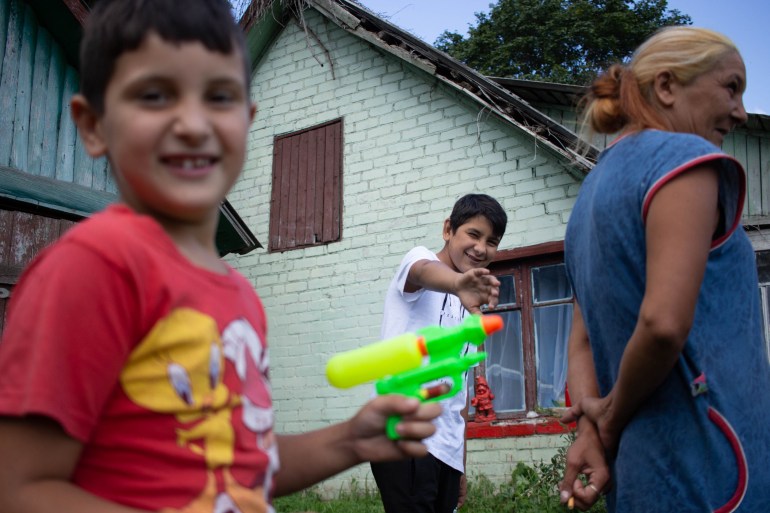
Despite facing the loss of a monthly compensation, Novopolskaja thinks many people still prefer to look for housing outside the city. “They know very well that taxes for heating in the city will be too high to pay so they will be looking for a simple house with a stove,” she said.
Based on the Lithuanian District Heating Association’s information on the 2017/2018 heating season, the cost of central heating for a 60-sq-metre (645-sq-ft) flat varied depending on its condition from 170 to 660 euros ($206-802). Most houses in the city have central heating, so finding alternative housing options that do not include this cost may only be available outside Vilnius.
In Rada’s case, a house outside the city was the only option she found.
Just before the family moved to Juodšiliai, Jonas said Vilniaus miesto būstas offered them a one-room flat in the city to stay in until something better came up. But that would have been “five people in one room”, so they declined the offer fearing they might get stuck there for a long time.
When asked about the difficulties Roma faced finding new places to live, former Vice Mayor Mitalas said: “Of course, maybe someone had difficulties but in my understanding, they were not significant that anything should have been changed.”
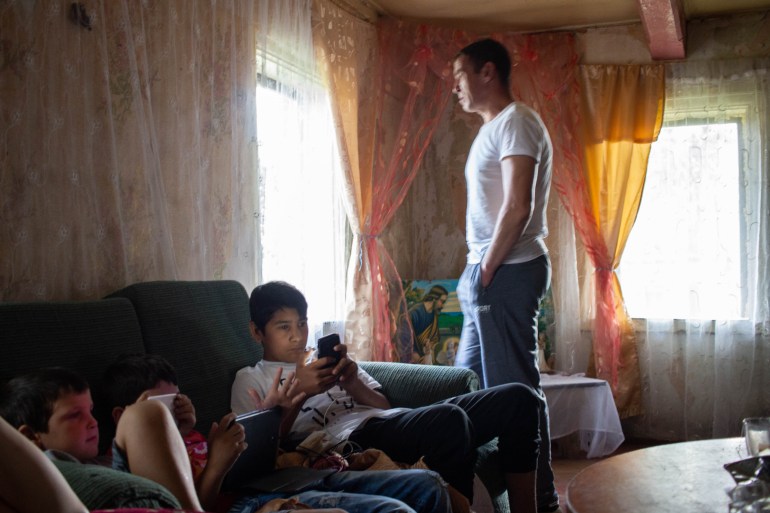
Jonas said he expected to be given what has been promised “or it should have been said from the very beginning: you are on your own. And everything would have been clear”.
“We have a 5,000 euros fine, the compensation is not coming and on top of that we are without a home,” said Rada.
Deeply rooted racism
Racism could be an additional factor making it difficult for Roma to find new homes. In Lithuania, Roma have for years been considered the least desirable neighbours. In 2019 more than 60 percent of people polled said they would not like to be neighbours with Roma, according to the annual monitoring of society’s attitudes conducted by the Institute for Ethnic Studies.
In 2015, the same annual survey included the question: “To which group of people would you not rent a flat?” Again, Roma topped the list – almost 70 percent of respondents said they would not want to rent property to a Roma.
“Prejudices can be felt in all parts of Roma life. Literally all,” said Simoniukštytė, adding that it destroys peoples’ lives: “People feel like living on a battlefield.”
In her opinion as an anthropologist, negative attitudes are causing the early withdrawal of Roma from the education system, and hindering their ability to rent property and find jobs.
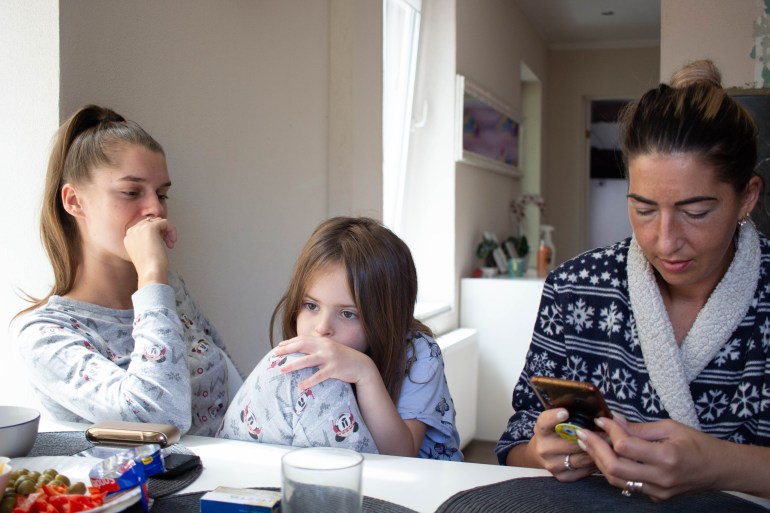
On a Sunday morning in Panevėžys, a city two hours away from Vilnius, 32-year-old Rasma Pažemeckaitė was in her kitchen having coffee with her neighbour Gabrielė. Rasma’s five-year-old twins Paula and Perla were playing in the living room.
Rasma was born here in the 1980s. When she was nine years old her father, who was Jewish, passed away, and her mother remarried a man from the Roma settlement in Vilnius. So between the ages of nine and 15, she was constantly moving between Vilnius and Panevėžys. “We just lived like that,” she said.
When Rasma was 15, she moved back to Panevėžys with her mother. There were several reasons for the move and one of them was drugs. “It’s no secret, drug trafficking started and my mom didn’t want her daughter to get into drugs or start selling them,” said Rasma. She added that she also wanted to move back to Panevėžys as she wanted to focus on studying and it was hard to do while constantly changing schools between two cities. “I used to say: Mother, do you want me to get married and live a life that doesn’t fit me? Do you want me to be happy or not?”
But in school, Rasma experienced bullying because of her ethnicity. She said when she was in the first grade her classmates once pushed her into the street so that a car would hit her. She was saved and safely brought back home by a stranger who was passing by.
Later on, she was badly beaten in one of the schools in Panevėžys. After that incident she switched to an arts school in Panevėžys where she did not face bullying any more. “I would cry but I wouldn’t tell my mother about the bullying. I only asked her to transfer me to another school,” said Rasma.
Because of her own experiences Rasma, with tears in her eyes, said she worries about her daughters’ future. “I am afraid that they will have to face racist attacks against them. What if they leave for school and I will receive a call saying that your twins were in a coma?”

For Rasma, racism did not end after graduating. After high school, she started working at an insurance company. Even though she was doing well she was fired four days after her mother visited the office. “One woman came to my mother as soon as she walked in [so] that she would leave. I told her that she is my mother. Four days later my coordinator came and said that I can no longer work here,” said Rasma. The reason she was given for her dismissal was that she was “unreliable”.
Because of such attitudes towards Roma, Rasma began to feel ashamed of her heritage and started hiding her ethnicity. “I used to say that I am Moldavian or someone else,” she explained. She lied about her ethnicity to her ex-husband and his family, too. “Maybe because of that we got divorced. But if my marriage ended because I am Roma, that marriage was worthless.”
Now Rasma is raising daughters who get angry when they are called Roma by their mother. Rasma said they are her life’s boomerang: “I used to be ashamed of my mother too.”
She blames society’s attitudes towards the Roma for that. And she is now determined to do everything to guarantee her children will not feel ashamed.
“Maybe I cannot make them proud, but at least I want that they wouldn’t be ashamed of being Roma,” she said.
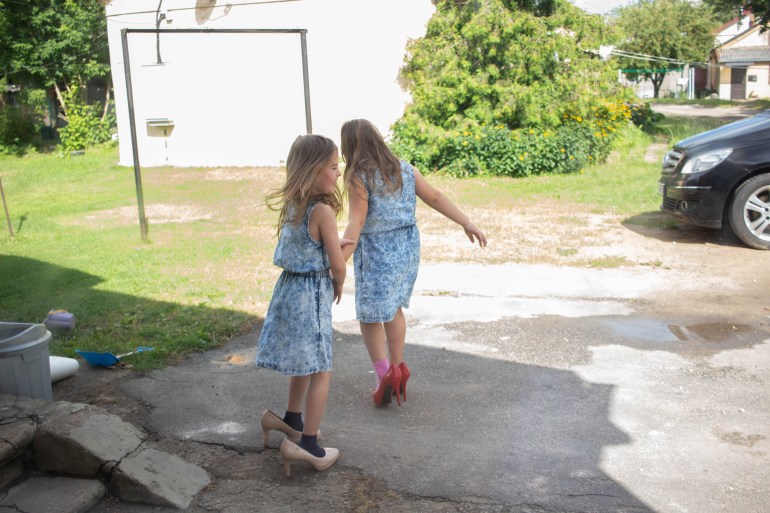
The future
Rasma now runs her own beauty salon, and believes that if she had not left the settlement she would not have fulfilled her potential. But she does not think that the eviction of the settlement in Vilnius will help improve social integration.
Both Kontvainė and Simoniukštytė, however, believe the demolition could lead to a positive change in the way Roma are perceived by the rest of Lithuanian society.
Societal education about Roma in Lithuania happens only through the media, Kontvainė noted. “Media has the biggest influence when forming an opinion about such small communities.” Therefore the demolition of the settlement removes their association with a space many see as being linked to drug trafficking.
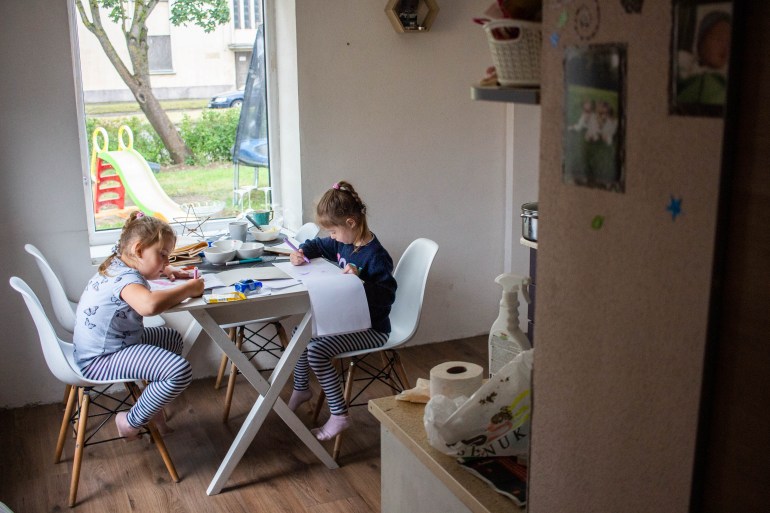
“[If] there is no settlement, there is no topic. New topics must be found and this can be a step forward,” said Kontvainė. “It was hard to change the image that Roma = the settlement; Roma = drugs. Until now,” she said.
The flaws in the Integration Plan
Based on information from Vilniaus miesto būstas, of the 93 Roma families who were evicted from the settlement, 56 have been accommodated in social housing or are using the rent compensation scheme, and 16 are still waiting to find a home.
Other households either did not declare their income and therefore were not offered any assistance, or never asked for compensation, the city housing body told Al Jazeera in an email.
In a phone interview, Mitalas, the former vice mayor, said he considered the demolition a success. But four years after the Roma Integration Plan came into action and after the demolition of the settlement six months ago, 16 families are still without a place to live.
Moreover, in September, the Roma society’s centre sent an additional list to Vilniaus miesto būstas of 52 families who are in need of rent compensation. These are people waiting for help with housing who were not included in the list of 93 who were evicted in 2016, the centre said. But Liaukonytė, the representative of Vilniaus miesto būstas, told Al Jazeera the Roma centre’s list is not accurate, and included several people who are registered abroad or have passed away.
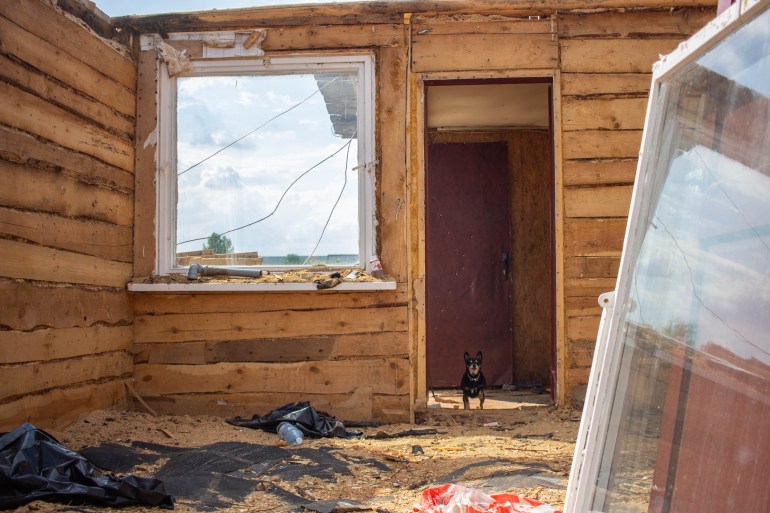
At the end of August, a new Roma Integration Plan for 2020-2023 was approved by the Vilnius municipality. It states that rent compensation will now be covered outside of Vilnius city, but this update to the plan is pending confirmation by the municipal council before it can be implemented.
In the meantime, Rada’s family, and others living outside of Vilnius, are still waiting for compensation and support. And at the same time, the Aleksandravičiais’ landlord has decided to sell the house they are living in in Juodšiliai – so they will be on the move yet again.
“The municipality has said that they gave money. In reality, we haven’t received anything,” said Rada. “They turned us out of our home. On TV it is said we got [a place] to live, but as I see it – I live on the street with my kids.
“I don’t know what to do.”